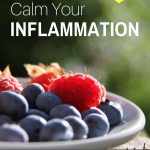Joe came into my office anxious, overweight and suffering from IBS. Joe came to see me to lose weight, and Joe was surprised that nutrition therapy could help with IBS. We were both surprised that nutrition therapy dramatically reduced his anxiety. 
We worked together for eight sessions, over about five months. After the first three sessions, in just six weeks, his IBS symptoms were gone and he had lost 8 pounds. Over the rest of our time together, he lost another 8 pounds and was no longer feeling anxious. During this time he also changed jobs, his wife changed jobs, and he injured his back. Job change and physical injury are anxiety-inducing life events, yet Joe handled them with ease.
The secret sauce was the anti-inflammatory diet I wrote about in Calm Your Inflammation.
Joe used these principles to get in touch with the traditional Italian diet of his grandparents. Going back to the vegetables, beans, grains, and greens his grandparents used to eat brought back a joy in eating that he had lost over the years.
When Joe first came in he was eating just to not be hungry, there was little joy in meals. They were purely utilitarian and boring, mostly protein shakes, protein bars, and plain grilled chicken with salad. To get a sense of satisfaction (that dopamine we all need) he was in the habit of grabbing some pastry and coffee every afternoon. This way of eating seems harmless, but it was contributing to making Joe feel unhealthy and unhappy.
Changing to an anti-inflammatory plan resolved the IBS symptoms, allowed for weight loss, and eased Joe’s anxiety.
Joe’s reduction in anxiety led me to the library to see what the research had to say about diet and mental health. Greens, vegetables, flax seed, soy, and fruit (especially berries) all have significant amounts of nutrients shown to have a positive effect on the brain. These foods are rich in vitamins and minerals, along with many antioxidants that cross into the brain to help keep it healthy.
Healthy Fats and Fiber
The healthy fats in flax, soy, and nuts are beneficial to the brain and reduce inflammation in the neural tissue. Inflammation in the brain not only contributes to anxiety and depression, but it can also lead to dementia and Alzheimer’s Disease.
The fiber in the vegetables, beans, nuts, and fruits promotes healthy bacteria in the intestines, which surprisingly helps reduce anxiety and depression. Those little bugs in our gut not only help prevent infection, promote healthy levels of sugar and cholesterol in our blood, they also keep our brains healthy too. Feeding them plenty of natural fiber from plant foods rewards them for their service.
We are not sure the exact mechanisms our intestinal bacteria use to keep us healthier, we just know they do. One possibility is serotonin. Close to 90% of our serotonin production occurs in the intestines, so it makes sense that the healthier the intestines, the better the serotonin production. Serotonin is a hormone associated with depression and anxiety, and low levels of serotonin make them worse. Healthy serotonin levels coupled with steady blood sugar are a dynamic duo for helping us keep a sunny outlook on life.
Sugar
Reducing the added sugar in Joe’s diet made a difference too. High levels of sugar increase anxiety, along with inflammation. Satisfying his sweet tooth with fresh fruit and dark chocolate, with the occasional instead of daily pastry, gave Joe the same satisfaction as a daily pastry without the anxiety-inducing side effects.
If this all reminds you of the MIND Diet, you are right. The berries, greens, vegetables, beans, nuts and whole grains that make the MIND diet so effective at preventing Alzheimer’s Disease seem to help reduce anxiety as well.
Joe went from someone who didn’t love what he was eating, who ate for purpose rather than pleasure, to someone who loves his food. He enjoys preparing new meals that are delicious – healthy is just a side benefit. Now his food is so satisfying he doesn’t need the afternoon pastry or even want it.
Chronic inflammation affects our bodies and our minds. Reducing it improves not only our health but also our healthy outlook. If you give this way of eating a try, you will also be surprised at how good you can feel.
 Calm Your Inflammation is available through Amazon and Barnes and Noble online. If you have already purchased the book, thank you!
Calm Your Inflammation is available through Amazon and Barnes and Noble online. If you have already purchased the book, thank you!
If you love it, please leave a review. It will help get this important information into more people’s hands. I’d love to hear your experience with the recipes, and how you made them your own.
Leave a Reply